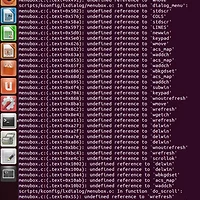반응형
32bit 리눅스 커널소스를 수정하는 과정에서 unsinged 64bit int를 unsigned 32bit int로 나누기를 시도했다. 그러자 결과는
:undefined reference to `__udivdi3' 라는 에러 메시지가 나를 기다린다.
__udivdi3() 함수는 glibc에 뭐 최근에 추가된 함수라던데 그래서 그 라이브러리를 추가하고 컴파일 할 때 static link해주면 된다는데. 커널 컴파일하는데 Makefile을 손대는 것은 곧 지옥이라 패스^^
그래서 내가 직접 32bit씩 끊어서 계산하려고 했다. 하지만 역시 나따위가 생각하는 것은 누구나 생각할 수 있는 것, 32bit 리눅스에 이미 구현이 되어있었다!
나머지 = do_div( u64 피제수, u32 제수);
몫은 피제수가 저장되어 있던 변수에 저장된다.
div64.h 라는 헤더파일에 있다.
보통 아키텍쳐마다 내용이 다르다. 필자의 경우에는 x86 아키텍쳐로 컴파일 하기 때문에 "arch/x86/include/asm/div64.h"를 참고했다. 내용은 다음과 같다.
/* SPDX-License-Identifier: GPL-2.0 */
#ifndef _ASM_X86_DIV64_H
#define _ASM_X86_DIV64_H
#ifdef CONFIG_X86_32
#include <linux/types.h>
#include <linux/log2.h>
/*
* do_div() is NOT a C function. It wants to return
* two values (the quotient and the remainder), but
* since that doesn't work very well in C, what it
* does is:
*
* - modifies the 64-bit dividend _in_place_
* - returns the 32-bit remainder
*
* This ends up being the most efficient "calling
* convention" on x86.
*/
#define do_div(n, base) \
({ \
unsigned long __upper, __low, __high, __mod, __base; \
__base = (base); \
if (__builtin_constant_p(__base) && is_power_of_2(__base)) { \
__mod = n & (__base - 1); \
n >>= ilog2(__base); \
} else { \
asm("" : "=a" (__low), "=d" (__high) : "A" (n));\
__upper = __high; \
if (__high) { \
__upper = __high % (__base); \
__high = __high / (__base); \
} \
asm("divl %2" : "=a" (__low), "=d" (__mod) \
: "rm" (__base), "0" (__low), "1" (__upper)); \
asm("" : "=A" (n) : "a" (__low), "d" (__high)); \
} \
__mod; \
})
static inline u64 div_u64_rem(u64 dividend, u32 divisor, u32 *remainder)
{
union {
u64 v64;
u32 v32[2];
} d = { dividend };
u32 upper;
upper = d.v32[1];
d.v32[1] = 0;
if (upper >= divisor) {
d.v32[1] = upper / divisor;
upper %= divisor;
}
asm ("divl %2" : "=a" (d.v32[0]), "=d" (*remainder) :
"rm" (divisor), "0" (d.v32[0]), "1" (upper));
return d.v64;
}
#define div_u64_rem div_u64_rem
static inline u64 mul_u32_u32(u32 a, u32 b)
{
u32 high, low;
asm ("mull %[b]" : "=a" (low), "=d" (high)
: [a] "a" (a), [b] "rm" (b) );
return low | ((u64)high) << 32;
}
#define mul_u32_u32 mul_u32_u32
#else
# include <asm-generic/div64.h>
/*
* Will generate an #DE when the result doesn't fit u64, could fix with an
* __ex_table[] entry when it becomes an issue.
*/
static inline u64 mul_u64_u64_div_u64(u64 a, u64 mul, u64 div)
{
u64 q;
asm ("mulq %2; divq %3" : "=a" (q)
: "a" (a), "rm" (mul), "rm" (div)
: "rdx");
return q;
}
#define mul_u64_u64_div_u64 mul_u64_u64_div_u64
static inline u64 mul_u64_u32_div(u64 a, u32 mul, u32 div)
{
return mul_u64_u64_div_u64(a, mul, div);
}
#define mul_u64_u32_div mul_u64_u32_div
#endif /* CONFIG_X86_32 */
#endif /* _ASM_X86_DIV64_H */
반응형
'Computer Science > Linux' 카테고리의 다른 글
| [Linux] File descriptor and Inode (0) | 2015.04.15 |
|---|---|
| [Linux] 커널 쓰레드(Kernel Thread)란? (0) | 2015.04.13 |
| [Linux] make menuconfig 에러 (0) | 2014.07.16 |
| [Linux] open()의 O_NONBLOCK 옵션 (4) | 2014.07.15 |
| [Linux] 리눅스 커널 버전 확인 (0) | 2014.07.14 |

